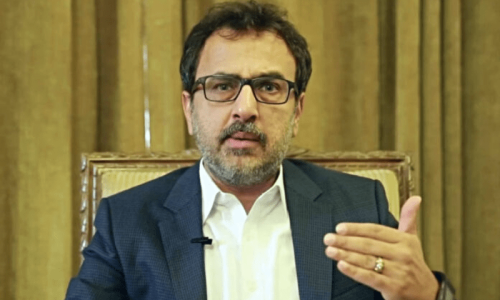LUXEMBOURG, June 22: European Union finance ministers were locked in difficult talks early Saturday, trying to resolve deep differences over how to manage closures of failing banks so as to prevent wider damage to the economy.
As the talks dragged on after an early start on Friday, hopes faded of an overall deal to finally put the banking sector’s problems to rest.
On Thursday, the 17 eurozone finance ministers had agreed how the single currency’s rescue fund, the European Stability Mechanism, could help the banks without adding to the already big debt burdens of member states.
The next step was to decide how to close banks when that would be the best solution, with the two facets combined in the Banking Recovery and Resolution Directive (BRRD) under discussion.
The European Union seeks to forge rules to force losses on large savers of failed banks, a taboo that was broken in this year’s bailout for Cyprus.
Finance ministers in Luxembourg are trying to resolve one of the most difficult questions posed by Europe’s banking crisis — how to shut failed banks without sowing panic or burdening taxpayers.
Ministers will make a fresh attempt to break the impasse at a meeting on Wednesday, on the eve of an EU leaders summit, and resolve one of the most difficult questions posed by Europe’s banking crisis — how to shut failed banks without sowing panic or burdening taxpayers.
“I think we can reach a deal if we take a few more days,” said Michel Barnier, the European commissioner in charge of regulation. “We are not far off now from a political agreement.” The European Union spent the equivalent of a third of its economic output on saving its banks between 2008 and 2011, using taxpayer cash but struggling to contain the crisis and — in the case of Ireland — almost bankrupting the country.German Finance Minister Wolfgang Schaeuble blamed the complexity of the issue and conflicting interests for not being able to reach a final result on Saturday. One EU official, who asked not to be named, described the meeting as chaotic.
At the heart of the disagreement, chiefly between Germany and France, was how much leeway countries should have when imposing losses on bondholders or large savers, a procedure known as “bail-in.” Such an approach was first tested out in Cyprus’ bailout in March, but making it the EU norm would mark a radical departure from the bloc’s crisis management in which taxpayers have footed the bill for a string of rescue programmes.
Britain, Sweden and France worry that forcing losses on depositors could cause a bank run or rattle confidence, and want countries to have wide-ranging freedom in deciding whether to take such bold steps.
Spain’s Economy Minister Luis de Guindos underscored the sensitivity of the issue. “What’s fundamental is there is agreement over the bail-in hierarchy and the protection of small depositors,” he said.
Germany, however, wants strict norms. Schaeuble said the new rules should not vary across the 27-nation European Union because that could put some banks at a competitive disadvantage.
“There’s clear disagreement between France and Germany. That’s why the meeting broke up,” said one EU diplomat. France’s Finance Minister Pierre Moscovici tried to play down any divisions and said a deal was possible next week.
While there is no immediate deadline for an agreement, indecision could hurt confidence in the ability of Europe’s politicians to repair the financial system, encourage banks to lend and help the continent emerge from economic stagnation. An agreement on European rules for closing banks is also a step required by Germany before it will sign off on a scheme for the 17-nation eurozone’s bailout fund to help banks in trouble, potentially important in helping Ireland.
“The fact that the euro zone countries are trying to push a solution is very dangerous for the rest of us,” Sweden’s Finance Minister Anders Borg told reporters.—Reuters















































